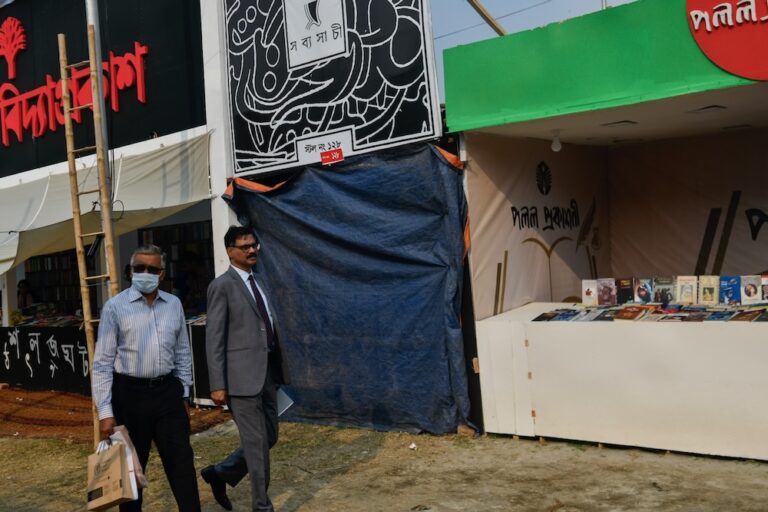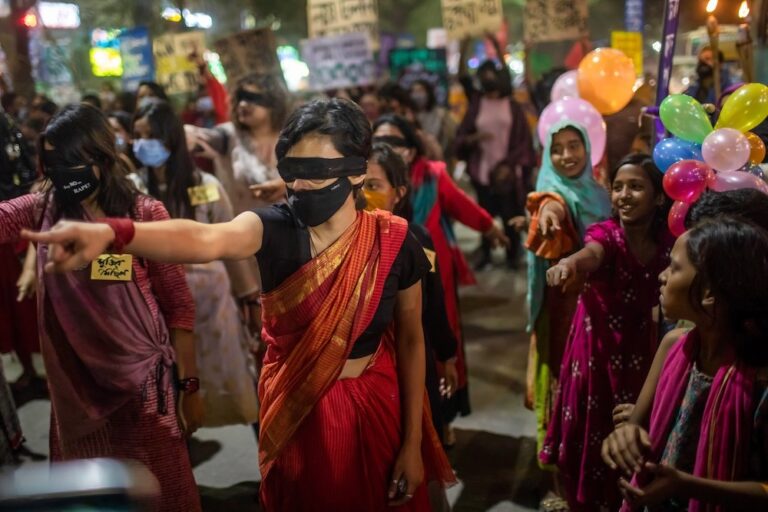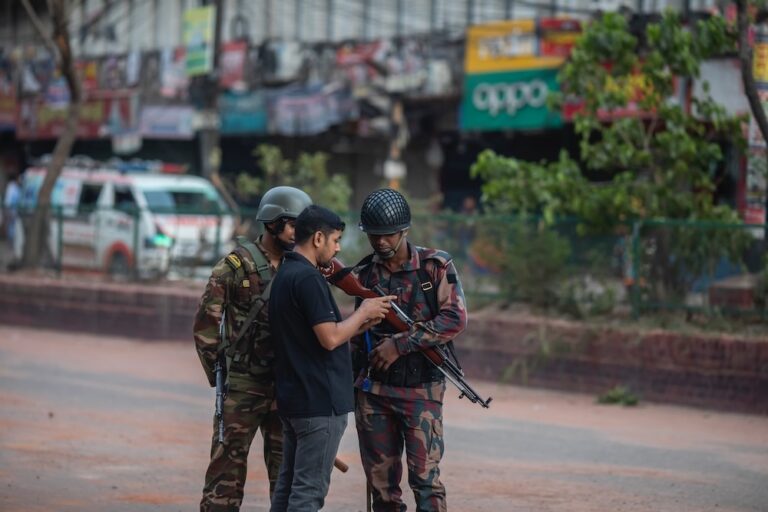(HRW/IFEX) – The following is an abridged Human Rights Watch press release: Bangladesh: Tortured Journalist Describes Surviving Military Beatings “Reform-Minded” Government Not Addressing Arbitrary Detention and Torture (New York, February 14, 2008) – The arbitrary arrest and torture of journalist Tasneem Khalil by Bangladesh’s notorious military intelligence agency highlights abuses under the country’s state of […]
(HRW/IFEX) – The following is an abridged Human Rights Watch press release:
Bangladesh: Tortured Journalist Describes Surviving Military Beatings
“Reform-Minded” Government Not Addressing Arbitrary Detention and Torture
(New York, February 14, 2008) – The arbitrary arrest and torture of journalist Tasneem Khalil by Bangladesh’s notorious military intelligence agency highlights abuses under the country’s state of emergency and the interim government’s failure to restrain the security forces, Human Rights Watch said in a new report today. Human Rights Watch called upon the Bangladeshi government, as well as the country’s donors, to urgently tackle the endemic problem of torture.
The 39-page report, “The Torture of Tasneem Khalil: How the Bangladesh Military Abuses Its Power Under the State of Emergency,” graphically details Khalil’s 22-hour ordeal in May 2007 in Bangladesh’s clandestine detention and torture system – a setup well known to the government, ordinary Bangladeshis, Dhaka’s donors, and diplomatic community.
“Rampant illegal detention and torture are clear evidence of Bangladesh’s security forces running amok,” said Brad Adams, Asia director of Human Rights Watch. “Tasneem Khalil’s prominence as a critical journalist may have prompted his arrest, but it also may have saved his life. Ordinary Bangladeshis held by the security forces under the emergency rules have no such protections.”
At a detention center operated by the Directorate General of Forces Intelligence (DGFI), the military intelligence agency, officers brutally beat and threatened Khalil, a journalist for the English-language Daily Star, part-time consultant for Human Rights Watch, and a news representative for CNN. Demonstrating just how confident they are that they will not be held accountable, DGFI officials even brought Khalil to meet the editor of his paper before returning him to the detention center for further beatings.
After his release and a month in hiding, Khalil fled Bangladesh for safety in Sweden, which granted asylum to him and his family. This report represents the first time that Khalil has spoken publicly of his experiences.
Late one night in May 2007, armed men presenting themselves as belonging to the “joint forces” came to Khalil’s apartment in central Dhaka. In front of his wife and infant, they pressed a gun against his lips, blindfolded him and brought him to a waiting car. He was taken to an interrogation center run by the DGFI, where he was held in a cell specially designed for torture. Khalil was threatened with execution and repeatedly kicked and beaten with batons on the head, arms, abdomen and other parts of the body. He was forced to confess to – and implicate friends and colleagues in – anti-state and anti-military activity, and to smuggling of sensitive national security information to foreign organizations.
Khalil was punished for his criticism of the security forces’ role in extrajudicial killings, torture, arbitrary arrests, and other abuses.
After tremendous international and national pressure, Khalil was released after 22 hours in custody. He then had to go into hiding for a month, before international pressure compelled the authorities to allow him to leave Bangladesh safely for asylum in Sweden. (. . .)
“The security forces have been arbitrarily detaining and torturing people, but there have been no serious attempts at holding those responsible for these criminal acts to account,” said Adams. “Why hasn’t the government made the protection of Bangladeshis from this scourge a priority? Are they reformers, or do they just say they are reformers?”
Human Rights Watch expressed its appreciation for the efforts by members of the international community to gain the release of Khalil from custody and secure his ability to leave the country afterward. But it called on donors, who have significant influence, to place a higher priority and to act with greater urgency to press the government to address torture and arbitrary detentions. Human Rights Watch noted that the government and donors know who was responsible for Khalil’s illegal detention and torture and where the facility is located, but no action has been taken.
“Bangladesh’s international friends need to make the eradication of torture a top priority in their relations with Bangladesh,” said Adams. “And they should press for the prosecution of the senior military and law enforcement officials responsible for running Bangladesh’s torture industry.”
Excerpts from Tasneem Khalil’s statement:
“[A member of the arresting party] jumped up from the chair, pulled out a revolver from his holster, pushed it against my lips, and started shouting, ‘You are under arrest.’ I started shouting back, telling them that what they were doing was illegal. Then all of them started shouting abusive words at me, telling me to shut up, otherwise there would be problems for my wife and child. Throughout, my wife Shuchi and son Tiyash were watching the whole thing.
“Then they asked me about my connections with Human Rights Watch. I told them I work as their consultant. When they inquired further, I told them I had worked with Human Rights Watch since 2006. I worked with Human Rights Watch on a report about extrajudicial killings by RAB. That suddenly infuriated them so much that all of them started hitting the table with hands and sticks and started shouting at me. ‘How dare you write against our brothers in RAB? You are a burden on society. You are an immoral, unethical insect, an anti-state criminal.’ Someone came around the table and started punching me on my head again.
“The Forum article made my interrogators furious. They started beating me again mercilessly, from all possible directions with hands and batons and kicks. I pleaded with them to give me one last chance. I said I would not do those things again. But one person said I had already ‘made the blunder.’ I think this was a reference to my lunch with the diplomats. (. . .)
The full report, including Khalil’s complete statement and a full list of contacts, is available at: http://hrw.org/reports/2008/bangladesh0208/


